i The Question of Political
Community
ii Frontiers of the Political
Series Editor:
Engin Isin is Professor of International Politics, Queen Mary University of London (QMUL) and University of London Institute in Paris (ULIP). He is a leading scholar of citizenship studies and is a Chief Editor of the journal Citizenship Studies. He is author and editor of eleven books in the field, including Being Political and Citizens Without Frontiers.
This series aims to contribute to our understanding of transversal political struggles beyond and across the borders of the nation-state, and its institutions and mechanisms, which have become influential and effective means of both contentious politics and political subjectivity. The series features titles that eschew and even disavow interpreting these transversal political struggles with categories and concepts.
Postcolonial Transitions in Europe: Contexts, Practices and Politics
Edited by Sandra Ponzanesi and Gianmaria Colpani
Citizenship and Place : Case Studies on the Borders of Citizenship
Edited by Cherstin M. Lyon and Allison F Goebel
The Question of Political Community : Sameness, Logos , Space
Jonna Pettersson
Postcolonial Intellectuals in Europe : Academics, Artists, Activists and their Publics
Edited by Sandra Ponzanesi and Adriano Jos Habed
Citizen Journalism as Conceptual Practice : Postcolonial Archives and Embodied Political Acts of New Media
Bolette B. Blaagaard
Governing Affective Citizenship: Denaturalization , Belonging, and Repression
Marie Beauchamps
iii The Question of Political
Community
Sameness, Logos , Space
Jonna Pettersson
iv Published by Rowman & Littlefield International Ltd.
6 Tinworth Street, London SE11 5AL, United Kingdom
www.rowmaninternational.com
Rowman & Littlefield International Ltd. is an affiliate of Rowman & Littlefield
4501 Forbes Boulevard, Suite 200, Lanham, Maryland 20706, USA
With additional offices in Boulder, New York, Toronto (Canada), and Plymouth (UK)
www.rowman.com
Selection and editorial matter Jonna Pettersson, 2019
All rights reserved . No part of this book may be reproduced in any form or by any electronic or mechanical means, including information storage and retrieval systems, without written permission from the publisher, except by a reviewer who may quote passages in a review.
British Library Cataloguing in Publication Data
A catalogue record for this book is available from the British Library
ISBN: HB 978-1-7834-8891-9
PB 978-1-7834-8892-6
Library of Congress Cataloging-in-Publication Data
ISBN 978-1-78348-891-9 (cloth: alk. paper)
ISBN 978-1-78348-892-6 (pbk: alk. paper)
ISBN 978-1-78348-893-3 (electronic)

The paper used in this publication meets the minimum requirements of American National Standard for Information SciencesPermanence of Paper for Printed Library Materials, ANSI/NISO Z39.48-1992.
Printed in the United States of America
v Contents
vii Acknowledgements
There are a number of persons who have been central to the completion of this book. I especially want to mention Jens Bartelson and Sofia Nsstrm for their insightful comments and difficult questions. A number of persons have read and commented on various versions and parts of the manuscript. I especially owe my gratitude to Lars Toender, Gregor Noll, Johan Tralau, Carl-Gran Heidegren, Ted Svensson, Hans Ruin, Catarina Kinnvall, Kimberly Hutchings, Nisha Shah, Petter Narby, Rickard Andersson, Cecilia von Scheele, Mia Orange, Daniel Steuer, Bjrn Badersten, Sara Kalm, Martin Hall, and Anna Sundell. I also want to thank Ylva Stubbergaard for her generous support.
Parts of this book were written at Northwestern University, and I am grateful to James Farr for finding me a room at Scott Hall. Thanks also to Crafoordska Stiftelsen, Fahlbeckska Stiftelsen, and Lars Hiertas Minnesfond for financial support.
I am highly indebted to the helpful editors at Rowman & Littlefield, and I particularly wish to thank Engin Isin for encouraging me to proceed with this project. My sincere thank you also to the external reviewers for their very perceptive and productive comments on the manuscript.
This book has in various forms been part of my life for a long time, and I want to thank my husband, Behrang, for his support and for bearing with me during these years. Finally, I owe my gratitude to my daughter, Anoushe, whose continuous interruptions of my work have given me the distance and distraction necessary to yet again return to the text. This book is for the two of you.
Introduction
From discussions on democracy to attempts to widen the scope for citizenship beyond the confines of the nation-state, Western thinking of the political community has continued to assume the community as requiring some form of unity or unifying principle that serves as delineation.
With the understanding of political communities as bearers of particular collective identities, they are seen as the same in relation to themselves. Simultaneously they are differentiated both against each other and against an amorphous outside made up of those who are denied access to the community. This book argues that this problem stems from how Western political thinking has assumed the political community to require unity or a unifying principle as its condition of possibility. It suggests that such a unifying principle takes the form of a supposed sameness, reflected in the history, space, language, and ultimately the logos of the community. This sameness grounds membership in the political community and ascertains its unifying delineations. Since the sameness of one community is either established in relation to, or productive of, something different to that community, the assumption of a delineating unity at the heart of the political community inescapably binds sameness to difference. Hence, the book argues that when unity forms the condition of possibility for thinking the political community, the problem of sameness doubling up with difference will persist, as will the closures of the meaning of politics and political existence.
There is a twofold aim to this book. On the one hand, it assumes a critical perspective by showing how relying on a notion of sameness that presupposes difference as the condition of possibility of the political community will also lead to attempts to widen the scope for inclusion to give rise to new exclusions. On the other hand, it takes on a normative and hermeneutical approach through developing a notion of sameness that does not presuppose difference and a notion of difference that does not rely on an underlying assumption of identity. The book suggests that confronting political problems of exclusion and closure means that the question of political community must be both reformulated and relocated. It must be reformulated so as to grasp the meaning of an incalculable community, and it must be relocated so as to make room for a place that disrupts the persistence of spatiotemporal continuity.
The primary ambition of the book is not to pursue a conceptual analysis and approach the meaning of community through conceptual history. It rather seeks to attend to how the thinking of community is predicated on assumptions of sameness that presuppose difference. The kind of community stemming from such assumptions is only of secondary importance to the study. Instead, the task undertaken is to see how a notion of sameness that presupposes difference forms a condition of possibility for thinking the community in various examples of Western political thought.

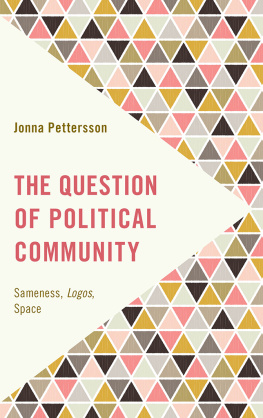


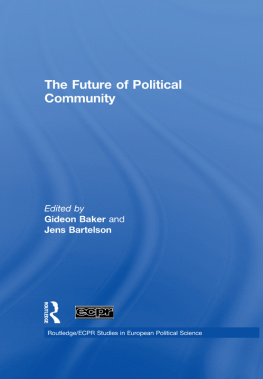
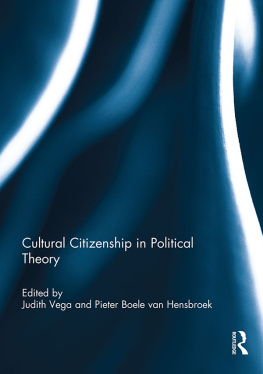
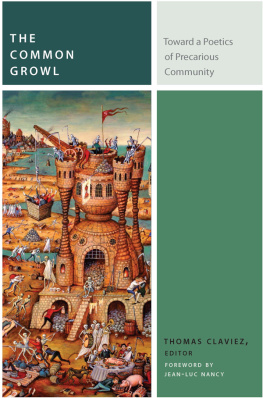
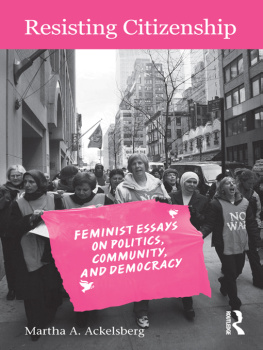
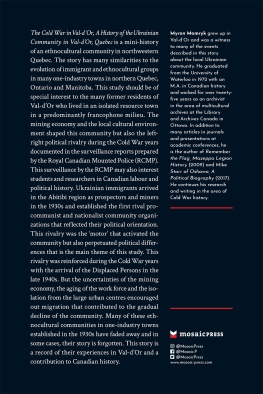
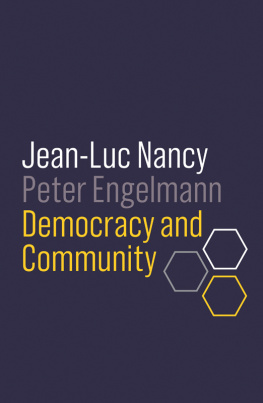
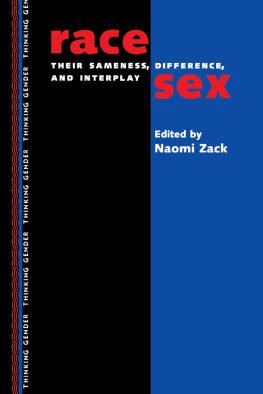
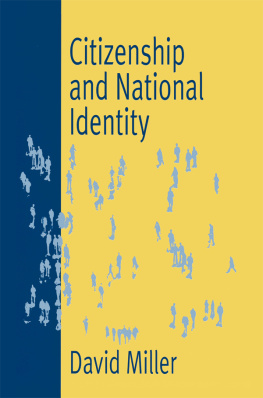
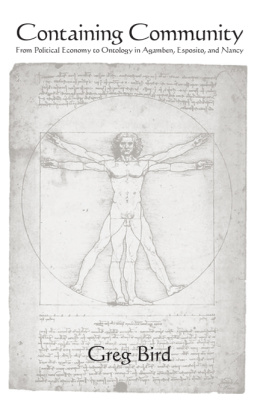

 The paper used in this publication meets the minimum requirements of American National Standard for Information SciencesPermanence of Paper for Printed Library Materials, ANSI/NISO Z39.48-1992.
The paper used in this publication meets the minimum requirements of American National Standard for Information SciencesPermanence of Paper for Printed Library Materials, ANSI/NISO Z39.48-1992.